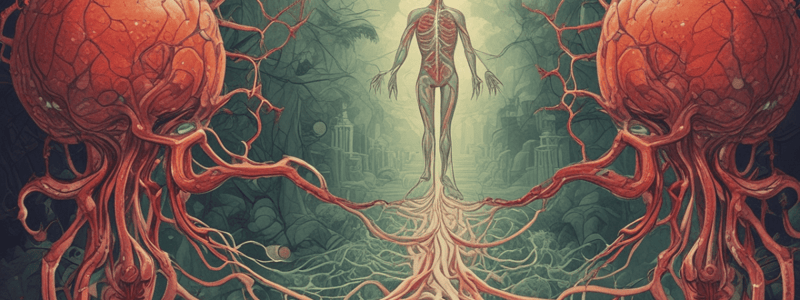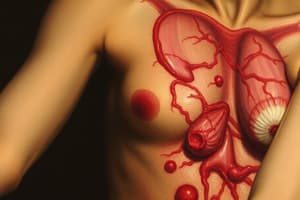Podcast
Questions and Answers
Where does lymph originally come from?
Where does lymph originally come from?
- Lymphatic vessels
- Endothelial cells
- Capillaries
- Blood vessels (correct)
What is the composition of lymph once it gets into the lymphatic vessels?
What is the composition of lymph once it gets into the lymphatic vessels?
- The same as extracellular fluid (correct)
- Different from extracellular fluid
- Only red blood cells and proteins
- Only water and glucose molecules
What percentage of blood is made up of red blood cells?
What percentage of blood is made up of red blood cells?
- 20% by volume
- 80% by volume
- 60% by volume
- 40% by volume (correct)
What is squeezed out of blood vessels to form lymph?
What is squeezed out of blood vessels to form lymph?
What is lymph called before it gets into the lymphatic vessels?
What is lymph called before it gets into the lymphatic vessels?
What is the main function of proteins in blood?
What is the main function of proteins in blood?
What is NOT represented in the drawing of blood?
What is NOT represented in the drawing of blood?
Why is it hard to draw all the red blood cells in the blood?
Why is it hard to draw all the red blood cells in the blood?
What is the approximate volume of fluid that is squeezed out of the capillaries per day?
What is the approximate volume of fluid that is squeezed out of the capillaries per day?
What is unique about the composition of lymph coming from the small intestine?
What is unique about the composition of lymph coming from the small intestine?
What is the primary function of the lacteals in the small intestine?
What is the primary function of the lacteals in the small intestine?
What happens to the proteins produced by the liver?
What happens to the proteins produced by the liver?
What is the approximate concentration of protein in lymph coming from the liver compared to other places?
What is the approximate concentration of protein in lymph coming from the liver compared to other places?
What is the eventual fate of all the lymph vessels, including the lacteals coming from the small intestine?
What is the eventual fate of all the lymph vessels, including the lacteals coming from the small intestine?
Where do the lymph vessels eventually merge and go to?
Where do the lymph vessels eventually merge and go to?
Why are the veins drawn in blue in the diagram?
Why are the veins drawn in blue in the diagram?
What is the percentage of red blood cells in lymph?
What is the percentage of red blood cells in lymph?
Which proteins have an easier time getting through the capillaries?
Which proteins have an easier time getting through the capillaries?
Why is it important that there is less protein in lymph than in blood?
Why is it important that there is less protein in lymph than in blood?
What is the approximate amount of lymph produced per day?
What is the approximate amount of lymph produced per day?
Which of the following is NOT a characteristic of lymph?
Which of the following is NOT a characteristic of lymph?
What is the reason why some fluid gets taken back up into the blood vessel?
What is the reason why some fluid gets taken back up into the blood vessel?
What is the ratio of albumin to immunoglobulin in lymph compared to blood?
What is the ratio of albumin to immunoglobulin in lymph compared to blood?
What happens to the protein concentration as fluid gets squeezed out of the capillaries?
What happens to the protein concentration as fluid gets squeezed out of the capillaries?
What is the primary reason why lymph has a lower concentration of protein than blood?
What is the primary reason why lymph has a lower concentration of protein than blood?
What is the function of the osmotic pressure in the blood vessel?
What is the function of the osmotic pressure in the blood vessel?
Flashcards are hidden until you start studying
Study Notes
Lymph and Blood Composition
- Lymph is the fluid that comes from blood vessels and is squeezed out through the little holes between capillaries
- Lymph is only called lymph once it gets into the lymphatic vessels, before that it's called extracellular fluid
- The composition of lymph is similar to blood plasma, minus red blood cells
- Lymph has about a half to a third the amount of protein compared to blood
Blood Composition
- Blood consists of about 40-45% red blood cells, 45% by volume
- Blood also contains water, proteins (of varying sizes), and other substances like glucose, fats, etc.
Lymph Production
- About 20 liters of lymph is squeezed out of blood vessels per day
- 17 liters of lymph comes back into the blood vessels, leaving a net 3 liters of lymph produced per day
Lymph Composition Variations
- Lymph composition varies depending on the location in the body
- In the small intestine, lymphatic vessels (lacteals) take up a lot of fats and chylomicrons, so lymph coming from there has a higher composition of fats
- In the liver, lymph has a higher concentration of proteins, up to 10 times more than lymph coming from other places
Lymphatic System
- Lymph vessels, including lacteals, eventually join up and come together to return to the blood circulation
- The merged lymph fluids with different compositions enter the veins and go back to the heart
Studying That Suits You
Use AI to generate personalized quizzes and flashcards to suit your learning preferences.




